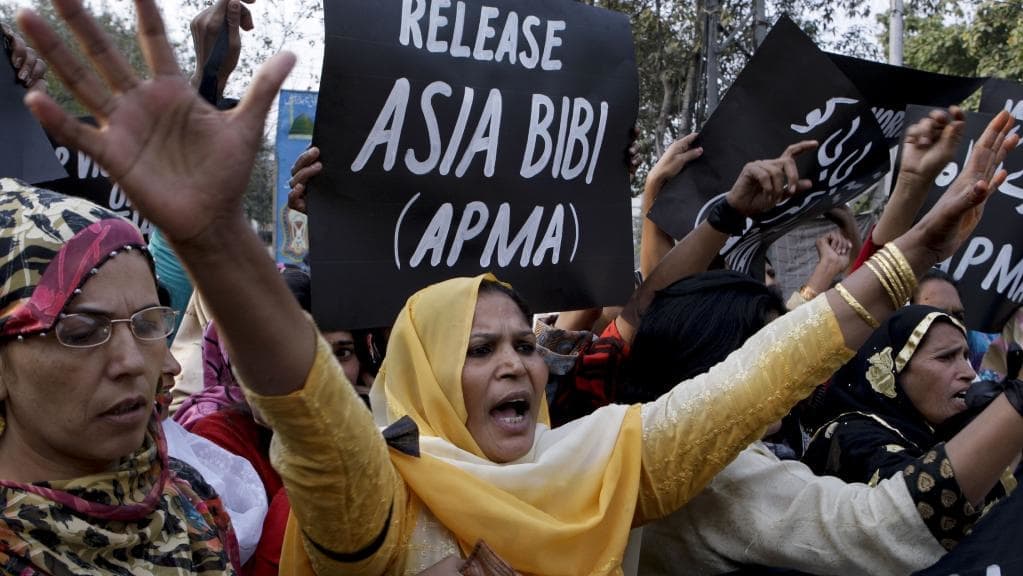NEW YORK — A leading Catholic parliamentarian in the United Kingdom is calling out his government for what he has labeled a failure to help Pakistani refugee Asia Bibi and other persecuted Christians around the world.
Bibi, an illiterate Catholic woman who spent nearly a decade on Pakistan’s death row over blasphemy allegations, was recently granted asylum in Canada, despite continued threats on her life.
RELATED: Asia Bibi reported to be on her way to Canada
Lord David Alton of Liverpool, a longtime vocal advocate for religious liberty, penned a searing critique of the British government’s lack of aid to Christians in the British weekly, The Catholic Herald.
“What does Britain, with its close links to Pakistan – not least £2.8 billion ($3.6 billion) of aid money over the past 20 years – contribute to this struggle? A clue appeared in this week’s Sunday Times,” he wrote. “A freedom of information request by Luke de Pulford, who has campaigned on the Bibi case for many years, asked how often Asia Bibi had been mentioned in diplomatic telegrams between Whitehall and Islamabad. The answer was: not once in the decade since her arrest.”
Alton, who unsuccessfully pushed for Bibi to be granted asylum in the United Kingdom, said that the individuals such as Bibi would be better served by being classified as victims of “persecution” rather than “discrimination” in order to help them obtain asylum.
“I wrote a report making that case, and submitted it to the Home Office. You can guess the response,” he wrote.
“But it is unquestionably persecution when mobs of 1,200 burn alive Christian parents and force their little children to watch. It’s persecution when an incredibly brave 12-year-old Christian boy, Iqbal Masih, is shot dead for rebelling against enslavement; when young girls are abducted, forcibly converted and taken as wives,” he continued.
“Not only does the government avoid the word ‘persecution,’ but it also seems uninterested in the problem. When you ask ministers how many claims for asylum in the UK were successful in respect of religious minorities from Pakistan over the past five years, the government says it would be “too expensive” to collect the data,” he wrote.
Recently, the UK Home Office – which is responsible for immigration affairs – came under fire for refusing asylum to an Iranian who had converted to Christianity, a capital offense in Iran. The rejection letter cited several passages of the Bible as “proof” that Christianity is not peaceful, one of the reasons the applicant said prompted his conversion.
Despite a history of reluctance, an interim report by the British government earlier this month said “acts of violence and other intimidation against Christians are becoming more widespread,” adding that they are reaching near “genocidal” levels.
RELATED: UK government panel warns of ‘genocidal’ persecution against Christians
The report, which was set up at the request of the UK foreign secretary, chronicled Christian persecutions in different parts of the world, from the Middle East to Latin America.
The full report is slated to be released later this summer.
During a press conference after the interim report’s release, Foreign Secretary Jeremy Hunt said the government has been “asleep on the watch when it comes to the persecution of Christians.”
Alton, who has spent considerable time in Pakistan, monitoring the situation of Christians and other religious monitories in the region, called on the UK government to reassess its priorities in light of Bibi’s high profile case.
“It is not just Christians who suffer from Pakistan’s culture of impunity; the whole country does. Persecution damages a country’s reputation and leads to mass emigration – often of just those people who could help the nation to flourish,” he wrote.
Asia Bibi’s release has been paid for in much suffering and blood. Two great advocates – [Shahbaz] Bhatti, a Christian, and [Salman] Taseer, a Muslim – were murdered for supporting her,” he concluded. “The best tribute Britain could give to their memory, to Asia Bibi…would be a redirection of our own political priorities.”
















